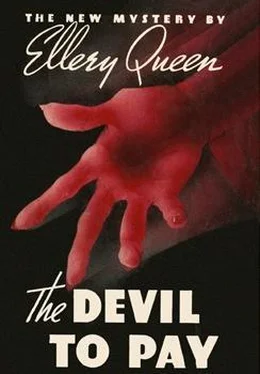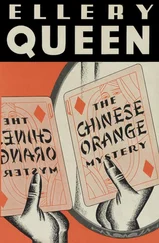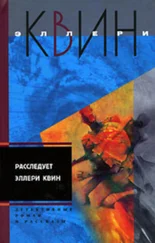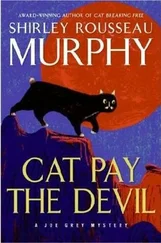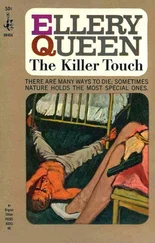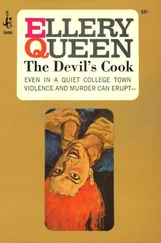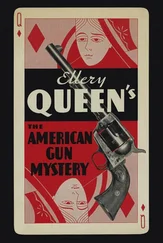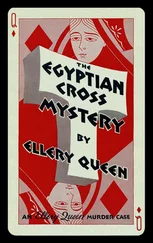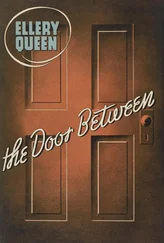“And who says it was unpremeditated?” said Ellery. “No, indeed, Mr. Jardin. Either the murderer took down the rapier and coated its tip with his molasses-and-cyanide concoction just before the crime; or else he had coated the point some time before the crime — prepared it, as it were. But in either event he had to mix the poison with the molasses before he killed Solly, which certainly rules out a crime of impulse.”
The tips of Inspector Glücke’s ears were burning by this time. “I’m not in the habit of running a forum,” he said in a strangled voice, “on a case I’m investigating. So you’ll all be good enough—”
“You smell from herring,” said Pink, who had formed a violent dislike for Glücke.
“And then,” said Ellery hastily, as if he might not be able to get it out before the catastrophe, “there’s my second question. Which is: Why did he smear the sword with poison at all?”
“Why?” shouted Glücke, throwing up his arms. “What the hell is this — Quiz Night? To make sure he died, that’s why!”
“Isn’t that a little like the man who wears not only suspenders but a belt, too?” asked Ellery earnestly. “Don’t you think you could kill a man very efficiently with merely a naked blade?”
Inspector Glücke had long since regretted his weakness in allowing the bearded young man to linger on the scene. The man was clearly one of those smart-aleck, theorizing amateurs whom Glücke had always despised. Moreover, he asked embarrassing questions before subordinates. Also, by sheer luck he might stumble on a solution and thus rob a hard-working professional of the prey, the publicity, and the departmental rewards of sensational success. All in all, a nuisance.
So the Inspector blew up. “I’m not going to have my investigation disrupted by a guy who writes detective stories!” he bellowed. “Your old man has taken it because he’s got to live with you. But you’re three thousand miles away from Centre Street, and I don’t give a hoot in hell what you think about my case!”
Ellery stiffened. “Am I to understand that you’d like me better at a distance?”
“Understand your left tonsil! Scram!”
“I never thought I’d live to see the day,” murmured Ellery, nettled but trying to preserve an Emily Postian savoir faire . “That’s Hollywood hospitality for you!”
“Mac, get this nosey lunatic out of here!”
“Desist, Mac. I’ll go quietly.” Ellery went over to the Jardins and said in a loud voice: “The man’s an idiot. And he’s quite capable of having you in the clink before you’re an hour older, Mr. Jardin.”
“Sorry you’re leaving us,” sighed Rhys. “I must say I prefer your company to his.”
“Thanks for the first kind word Hollywood has bestowed. Miss Jardin, goodbye... I’d advise both of you to talk as economically as possible. In fact, get a lawyer.”
Inspector Glücke glared at him. Ellery went sedately to the door.
“Not, however,” he added with a grimace, “Mr. Ruhig.”
“Will you get out, you pest?” roared the Inspector.
“Oh, yes, Inspector,” said Ellery. “I almost forgot to mention my third point. You remember I said there were three bothersome questions?” Mac approached grimly. “Now, now, Mac, I must warn you that I’ve just taken up ju-jitsu. The point is this, Inspector: Granting that your eccentric criminal stood on a chair to get a sword for which he had a much handier substitute, granting that he smeared the sword with poison when a good jab by a child could have dispatched Mr. Spaeth just as efficiently — granting all that, why in heaven’s name did he take the sword away with him after the crime?”
Inspector Glücke was speechless.
“There,” said Mr. Queen, waving adieu to the Jardins, “is something for that ossified organ you call your brain to wrestle with.” And he went away.
VII
The Camel That Walked Like a Man
Val could scarcely drag one foot after the other by the time they got back to the La Salle . Even the yearning for sherry frappés had dissipated. It was agony just to think.
“I’ll tuck pop in, flop onto my bed, and sleep, ” she thought. “Maybe when I wake up tomorrow morning I’ll find it never really happened at all.”
After that strange Mr. Queen’s departure Inspector Glücke had cleared the study and gone to work on Rhys with a grim enthusiasm that made Val vibrant with pure loathing. Pink became rebellious at the tone of the man’s questions and was ejected by two of the larger detectives. They found him later, sitting on the sidewalk near the gate in the midst of a large section of the Los Angeles press, chewing his fingernails and growling at their pleas like a bear.
Even in the excitement of their own miraculous escape from that rapacious crew — Pink said they had the morals of a bulldog, and that they wouldn’t have escaped at all if not for the greater lure still within the Spaeth house — Val’s stomach lay six inches lower than its usual position merely recalling Glücke’s baffled pertinacity.
Throughout the ordeal Rhys had maintained a calm that served only to infuriate the policeman. He was monosyllabic about most things; and about the important things he would not talk at all. The Inspector went over and over the ground: The Ohippi partnership, the holding companies, the collapse of the securities, Rhys’s quarrels with Spaeth, his movements during the afternoon — oh, thought Val, to have been able to tell the truth! — his familiarity with the house, with swords...
Her father could have cleared himself at any moment of the interminable, ferocious, accusing inquisition by merely stating his alibi. But he did not; and Val, sick and exhausted, knew why he did not. It was because of Walter. Walter.... She hardly heard Glücke’s diatribe. Through the verbal storm leered Walter’s face with its incomprehensible expression.
Rhys was deliberately allowing himself to be involved in a nasty crime because Walter meant something to her — Walter, who had always been so boyish and naïve and blunt and was now so frighteningly drawn into himself.
“I’ll fix some eats,” said Pink. “You must be starved.”
“I couldn’t eat now,” said Valerie faintly.
Rhys said. “Pink’s right,” but he was abstracted.
“I laid in a raft of stuff from the market this afternoon,” said Pink gruffly, “on my way back from the studio. If I left it to you capitalists—”
“Oh, Pink,” sighed Val, “I don’t know what we’d do without you.”
“You’d probably die of hunger,” said Pink.
Mibs Austin’s place at the switchboard was occupied by the night clerk, a fat old man in a high collar; so they went through the lobby without stopping and took the cranky elevator upstairs. Val stumbled along the red carpeting of the corridor behind the two men. She wondered dully why Rhys and Pink, who had unlocked the door of 3-C, stood so still in the foyer.
But when she reached the apartment door and looked in she saw why.
Walter was sitting in the living-room on the edge of the armchair. He was sitting in a strangely stiff attitude, his dirty hat crushed on the back of his bandaged head and his eyes like two steamy pieces of glass.
They looked at Walter, and Walter looked back at them, and his head wagged from side to side as if it were to heavy for his neck.
“Stinko,” said Pink, wrinkling his nose, and he went to the windows and threw them wide open.
Rhys carefully closed the corridor door and Val advanced two steps into the living-room and faltered: “Well?”
Walter’s tongue licked at his lips and out of his mouth came a mumble of sounds that conveyed nothing.
Читать дальше
